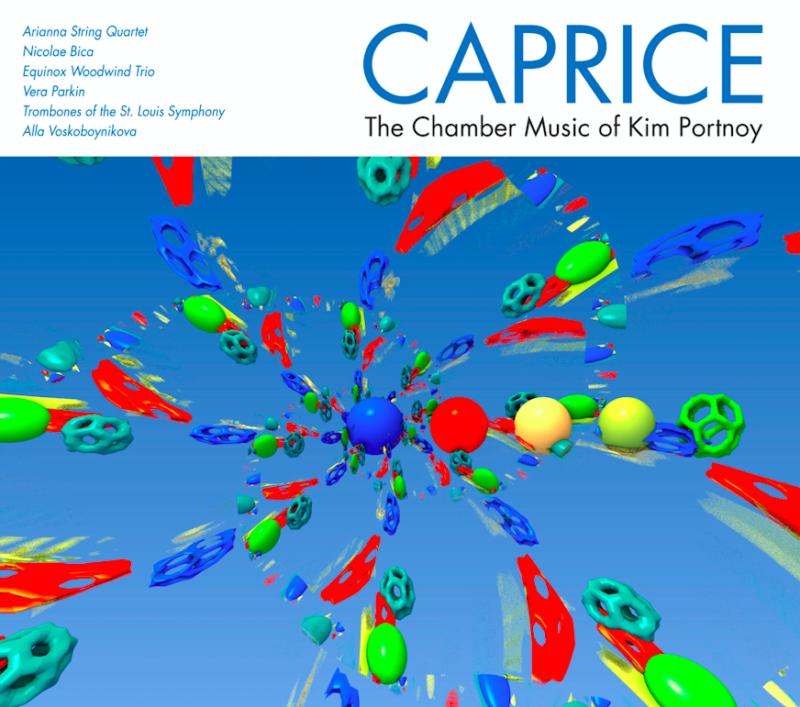INTERVIEW: Kim Portnoy releases new album of chamber music
Image courtesy of the artist / Provided by Crossover Media with permission.
Kim Portnoy, the celebrated composer, arranger and jazz pianist, recently released his new album Caprice: The Chamber Music of Kim Portnoy, which features his work alongside the trombones of the St. Louis Symphony, the Arianna String Quartet and others.
Over the years, Portnoy has collaborated with many different musicians and orchestras, including the Eastman Summer Trombone Institute in Rochester, New York; the Choral Music Experience Institute in Sweden; and the United States Air Force Band of Mid-America, among others. When he’s not composing original work, he’s teaching at Webster University in St. Louis, a college he has been with for more than 30 years.
Recently Hollywood Soapbox exchanged emails with Portnoy about his new album. Questions and answers have been slightly edited for style.
What can your fans expect on the new Caprice album?
Variety. Though this album is labeled as ‘classical,’ (and the music was written using traditional techniques and forms), its attitude is much more inclusive, embracing a wide mix of styles. The six pieces on the CD incorporate funk, blues, tango, salsa, samba, atonal swing and zydeco.
There are also ensembles of varying sizes and instrumentations: a guitar duo, a piece for violin and piano, a woodwind trio, one each of string and trombone quartet, and a quintet for string quartet and piano.
Another thing to expect are compositions that (regardless of style) reflect my musical ‘value system.’ The qualities in music that have always attracted me — lyricism, harmonic richness, colorful timbres, groove-oriented rhythms, humor and a broad emotional pallet — are qualities that I strive for in my own work. Ultimately the hope is that I have written music that draws listeners in, sustains their interest and ideally, delights or moves them. Whether I have succeeded at any of the above is, of course, in the ear of the beholder.
What do you especially love about composing chamber music?
Though a relatively small part of my output, writing instrumental chamber music has always been a particularly pleasurable experience. In large part that is due to the very high skill level and musicality of musicians who have asked for, commissioned and played the resulting works. Another particularly rewarding aspect is the increased level of interaction with the players; it’s invaluable to get instant feedback from a violinist, for example, when asking about a particular technique. (Word to the wise: many violinists won’t bow their strings with a scouring pad.)
There is also a practical aspect to writing chamber music; one is more apt to get a woodwind trio played than a work for orchestra. An unperformed composition is like the proverbial ‘tree in the forest.’ Composers want to know that their pieces will ‘make a sound.’
Are there any limitations to creating chamber music? Does the relatively small number of instruments make it difficult?
There are limitations to creating any music, whatever the size of the ensemble, and most limitations are imposed by the composers themselves. A composer might decide to build an entire piece on three notes or write a fugue in five keys at once. Ideally, each limitation prompts a question: ‘What can I do with this,’ which in turn exercises the composer’s creative ‘muscle’ to search for an answer.
The number and type of instruments in a piece then is just another creative ‘problem’ to solve: ‘What can I do with flute, tuba and accordion?’
Of course, the better a composer is at imagining the instruments’ sounds and understanding their technical capabilities, the greater the chance of conjuring a satisfying idea that ‘lays well’ on an instrument and is satisfying to play. If I have been asked to compose for a trombone, but the idea I have written is more appropriate for a flute, there is going to be one very grumpy trombone player on my hands.
Were you impressed by the music of your collaborators on the album?
I was thrilled by the contributions of my collaborators on this album, but not surprised. St. Louis is home to many wonderful world-class musicians in every genre: jazz, blues, rock, hip-hop and, of course, classical. Fortunately, over the years I have been privileged to compose for or perform with many of the musicians on this recording. As they are all consummate professionals, a high-caliber performance was a given.
What I was most impressed with (and humbled by) was the level of care the performers took with each piece. They would often improve a take by making suggestions about phrasing, articulation, etc. Their enthusiasm and good humor made the sessions a joy. I am grateful for their existence in this world and their willingness to play my music.
How much has COVID-19 disrupted your music career?
Because I am fortunate to have a full-time teaching position at Webster University in St. Louis, any disruptions have been strictly ‘first-world’ problems. Last March I was busily preparing for a concert of new works when COVID-19 forced public performances in St. Louis to shut down. It also forced Webster University to go exclusively to an online format — a daunting task for one as technically challenged as myself. As a result, my muse was comatose for some months. It is beginning to slowly awaken while I rethink the way I make and share music in the new ‘normal.’ To continue to create, it will be necessary to learn technologies that I have avoided previously. Growth is good. Not writing is not a viable option.
Why is it important for you to be a music educator as well?
The students that I have the opportunity to teach are talented, enthusiastic, creative and passionate about music. It’s a great gift to be able to contribute to their growth as musicians, as my teachers contributed to mine. To be in the presence of young people is life affirming, especially for an old guy! Seeing students in the ‘honeymoon’ stage of their relationship with music reminds me why I became a musician.Though I basically stumbled into teaching, it has ended up being a wonderful and meaningful career. It has allowed me to live a life in music for which I’m grateful.
By John Soltes / Publisher / John@HollywoodSoapbox.com
Kim Portnoy’s new album is Caprice: The Chamber Music of Kim Portnoy. Click here for more information.


